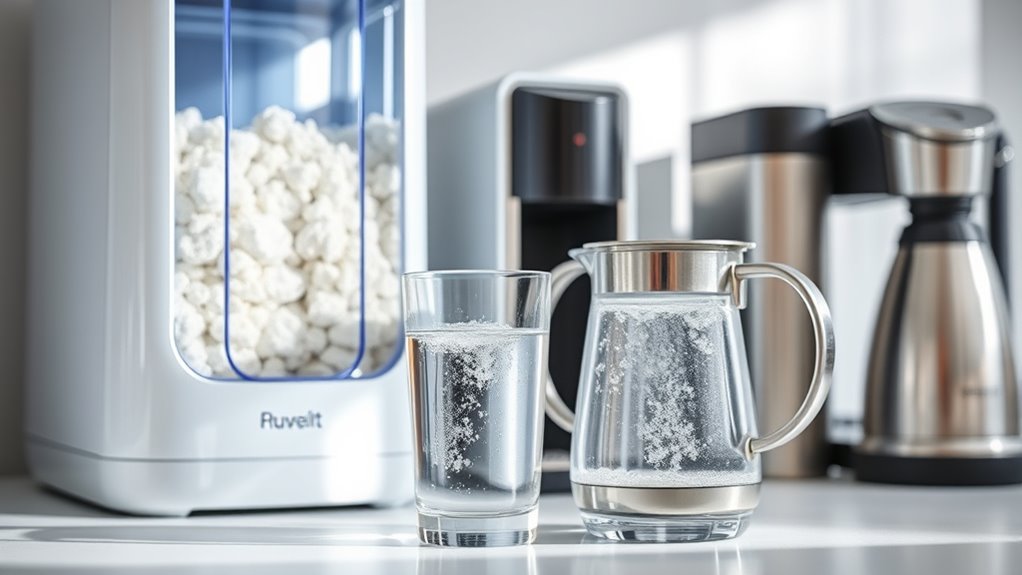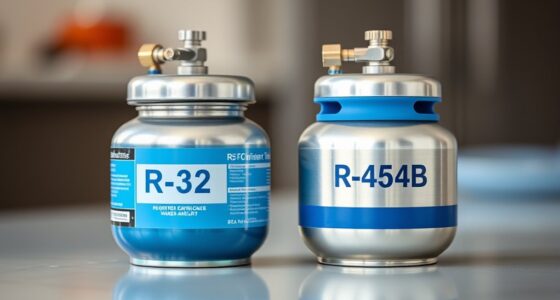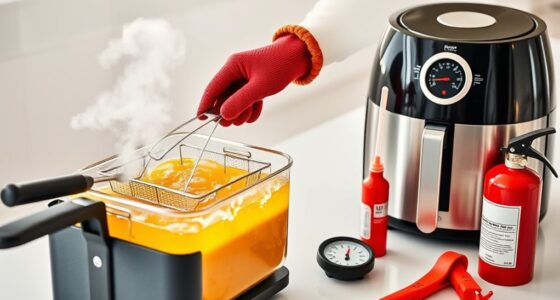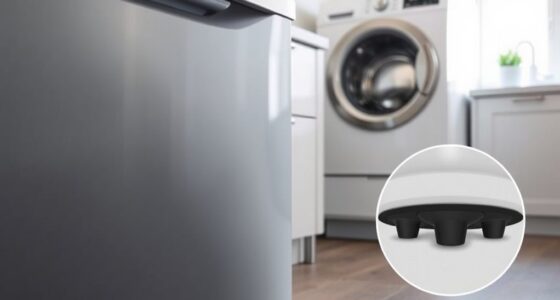Water softeners play a vital role in protecting your small appliances from hard water damage. They remove minerals like calcium and magnesium that cause mineral buildup inside appliances, pipes, and fixtures. Without a softener, hard water can lead to clogs, reduced efficiency, and shorter appliance life. Using a softener not only extends your appliances’ lifespan but also improves water quality for laundry and dishes. Keep exploring how a water softener can benefit your home.
Key Takeaways
- Water softeners remove minerals like calcium and magnesium, preventing mineral buildup inside small appliances.
- Softened water improves appliance efficiency by reducing limescale and soap scum accumulation.
- Using soft water extends the lifespan of household appliances such as dishwashers and washing machines.
- Soft water decreases the need for harsh cleaning chemicals, lowering maintenance costs and chemical residue.
- Proper water treatment with a softener enhances overall water quality, benefiting appliance performance and household hygiene.
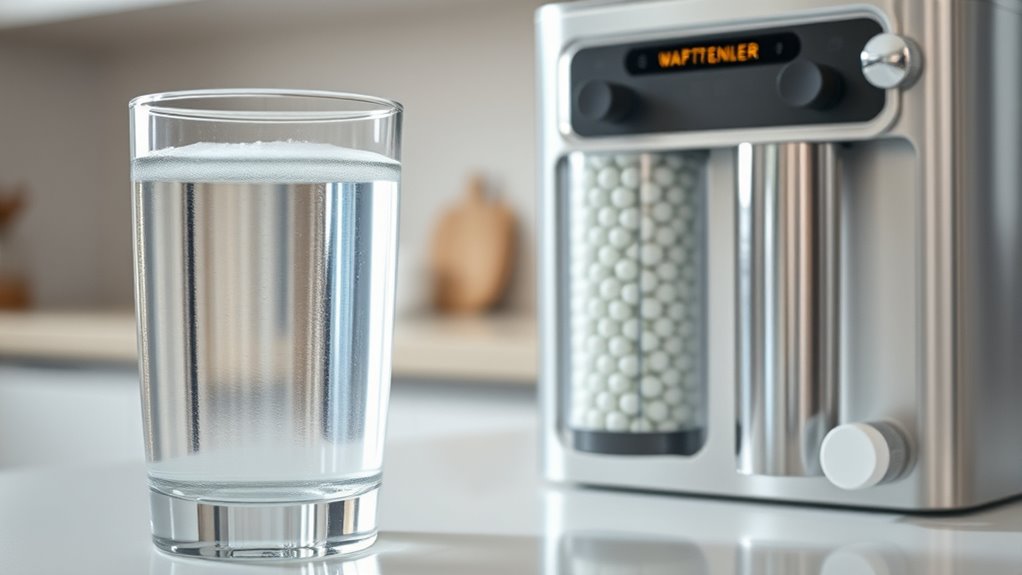
Water softeners are devices that remove minerals like calcium and magnesium from your household water, preventing the buildup of limescale and soap scum. If you’ve noticed white deposits on your fixtures, dullness in your dishes, or soap that just doesn’t lather well, hard water issues are likely the culprit. These minerals, while harmless to your health, can cause significant problems in your home. Hard water leads to mineral deposits inside pipes, making appliances work harder and reducing their lifespan. It can also cause soap and detergent to form scum rather than lather, decreasing cleaning efficiency and leaving residues on your skin and hair.
Water softeners remove minerals like calcium and magnesium, preventing limescale, soap scum, and appliance damage.
By installing a water softener, you’re tackling these issues head-on. Soft water benefits extend beyond just protecting your appliances; they improve your everyday life. For example, with soft water, your skin feels smoother, and your hair becomes more manageable because you’re not battling the drying effects of mineral buildup. Your laundry comes out cleaner and brighter, as soap and detergent work more effectively without mineral interference. Plus, your dishes look clearer and less spotted, saving you time and frustration during cleanup.
Water softeners are particularly effective for addressing hard water issues. Instead of constantly scrubbing away mineral deposits or dealing with the inconvenience of soap scum, you’ll notice a remarkable difference almost immediately. Appliances like coffee makers, dishwashers, and washing machines will run more efficiently because they’re not battling mineral buildup. This means fewer repairs and a longer lifespan for your investments. Additionally, plumbing pipes stay cleaner, reducing the risk of clogs and corrosion caused by mineral deposits. Proper water treatment can also enhance the efficiency of many household systems, leading to energy savings and less wear and tear.
When you opt for a water softener, you’re also reducing the need for harsh cleaning chemicals. Soft water makes cleaning easier, meaning you can use less detergent and still achieve sparkling results. Over time, this saves you money and reduces your household’s environmental footprint. The soft water benefits extend beyond just convenience; they promote better appliance performance, healthier skin and hair, and cleaner homes.
Frequently Asked Questions
Do Water Softeners Remove All Types of Minerals From Water?
Water softeners don’t remove all types of minerals from your water. They primarily target calcium and magnesium, which cause hardness, through ion exchange. However, other minerals like iron, manganese, or heavy metals may require additional treatment methods. So, if you want thorough mineral removal, consider extra filtration options. Understanding your water composition helps determine the best approach to guarantee clean, soft water tailored to your needs.
How Often Should I Replace the Salt in My Water Softener?
You should replace the salt in your water softener every 4 to 6 weeks. Ignoring salt maintenance can lead to reduced efficiency and mineral buildup. Keep an eye on the brine tank; when the salt level drops below half, it’s time for a replacement. Stick to a regular replacement schedule, and you’ll guarantee your softener works flawlessly, preventing surprises and maintaining ideal water quality.
Can Water Softeners Cause Any Health Issues?
Water softeners generally don’t cause health issues for most people, but some may have concerns about mineral imbalances, especially with high sodium levels. If you have hypertension or kidney problems, you might want to limit soft water intake or consult your doctor. For healthy individuals, soft water is safe; just make certain regular maintenance to prevent bacterial growth. Overall, water softeners are safe when used properly.
Are Water Softeners Effective in Hard Water Regions?
Yes, water softeners are effective in hard water regions. They provide hard water treatment by removing minerals like calcium and magnesium, which cause hardness. This soft water benefits your home by preventing scale buildup, extending appliance life, and improving soap efficiency. With regular maintenance, water softeners guarantee you enjoy consistent soft water, making daily chores easier and protecting your plumbing system from damage caused by mineral deposits.
What Is the Environmental Impact of Water Softeners?
Think of water softeners as double-edged swords—while they protect your appliances, they also leave an environmental footprint. They can cause environmental concerns due to the discharge of salt and chemicals, and their energy consumption adds to your carbon footprint. You might feel good about extending appliance life, but it’s essential to weigh these impacts. Being mindful of proper disposal and choosing eco-friendly options helps balance out their environmental effects.
Conclusion
In the end, investing in a water softener can truly transform your experience with small appliances and water quality. It’s a small step that yields big results, protecting your appliances and saving you money. Remember, a stitch in time saves nine—addressing hard water issues early keeps your appliances running smoothly and prolongs their lifespan. Don’t wait until problems arise; take action now to enjoy better water and appliance performance for years to come.
